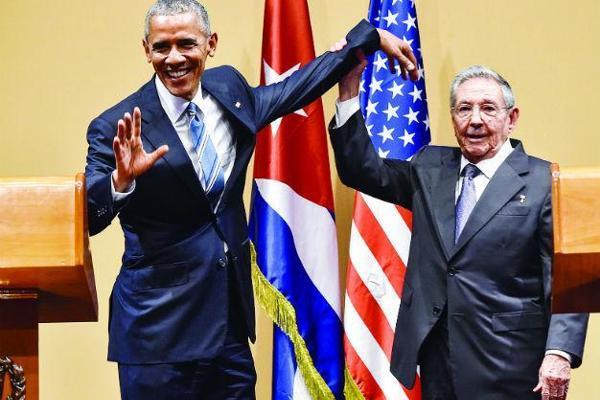Obama spars with Cuba’s Castro over human rights in historic visit
HAVANA – Reuters


AFP photo
U.S. President Barack Obama pushed Cuba to improve human rights during his historic visit to the Communist-led island on March 21, publicly sparring with President Raul Castro who showed flashes of anger and hit back at U.S. “double standards,” while also setting aside differences in pursuit of a “new day,” as Obama called it.Obama praised Castro for openly discussing their differences but he said a “full flowering” of the relationship would happen only with progress on the issue of rights.
“In the absence of that, I think it will continue to be a very powerful irritant,” Obama said in a joint news conference with Castro that began with jokes but was tense at times.
“America believes in democracy. We believe that freedom of speech and freedom of assembly and freedom of religion are not just American values but are universal values,” he said.
Both men’s remarks were broadcast live on Cuban state television from Cuba’s Palace of the Revolution in a room draped with the Stars and Stripes and the Cuban flag.
Castro countered that no country meets all international rights but appeared uncomfortable as he made the rare step of taking questions from journalists in a country where the media is state controlled.
Obama, the first U.S. president to visit Cuba in 88 years, agreed in 2014 to improve relations with the former Cold War foe but he is under pressure at home to push Castro’s government to allow political dissent and to further open its Soviet-style economy.
Obama hailed a “new day” - a “nuevo dia,” as he said - in relations between the former Cold War foes.
He said the two sides would hold talks on human rights in Havana later this year.
Castro, an army general who became president when his ailing older brother Fidel retired in 2008, had never before taken questions from foreign reporters on live Cuban television and was clearly irritated when asked about political prisoners in Cuba, demanding the reporter produce a list of those in jail.
“Tell me now. What political prisoners? Give me a name, or the names,” Castro said. “And if there are these political prisoners they will be free before nightfall.”
Cuba says it has no political prisoners and that the dozens listed by dissident groups are instead common criminals.
Castro said Cuba has a strong record on rights such as health, access to education and women’s equality. His government criticizes the United States on racism, police violence and the use of torture at the Guantanamo Bay naval base in Cuba.
Ben Rhodes, a senior Obama aide, later insisted that Cuba has political prisoners and said the U.S. government had shared lists of them with Cuba. He said Cuba has shifted from long prisons terms to short-term detentions of political opponents.
Later in the evening, Castro sat between Obama and First Lady Michelle Obama for a dinner of rum flavored soup and pork, at a table that also included the leaders’ top advisers.
